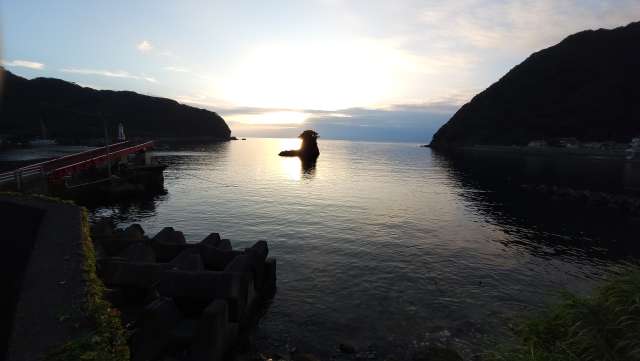The west coast of Izu Peninsula is open to seasonal typhoons in summer and autumn and a strong, cold gale-like winds that come in over the Southern Alps from Korea and Siberia in the winter months. But Arari, being surrounded on three sides by tall mountains and a protected port entrance on the remaining side provides a place of safety for other less-protected fishing harbors on the western coast during such periods.
The formation of mountains surrounding the Arari port consists of two short valleys with one at the entrance and the other at the far end. The valley in the middle is longer and stretches up into the mountains. While each valley has its own stream, the one in the middle runs continuously and enters the valley as it flows over the edge of an ancient lava flow creating a curving waterfall that the villagers call Otaki-sama.
The village itself is divided into three parts with each being located in one of the valleys. Walking from one end to the other end is a matter of just a few minutes. The number of inhabitants is 951 which varies from month to month with generally a decrease in population as the increasingly aging villagers pass away and the younger ones leave to live in the city once they graduate from high school.
Once a thriving fishing town boasting over 30 large fishing ships, only one rusty vessel remains today. Most of the older men in the village once sailed on these ships and are more than happy to tell you of their experiences abroad as they sailed to distant seas to catch fish and visited foreign ports to deliver their catches and replenish their ships. Today, a few of them have much smaller fishing boats that they may or may not take out to sea where they fish locally. As with the larger ships, the number of the small er boats, which may only measure 20 to 30 feet in length, is decreasing. Fishing has become increasingly less profitable as fish stock has decreased. In addition to this, a changing climate has caused the traditional fish species to move further north without the benefit of having other profitable species to move in.
An aging population probably has the most negative impact on the number of fishermen. For many, ownership of a boat is little more than something to keep them occupied either in fishing or in maintenance. You will see two or three grouping together early in the morning either sitting on benches in front of their boats, or puttering around inside of them.

